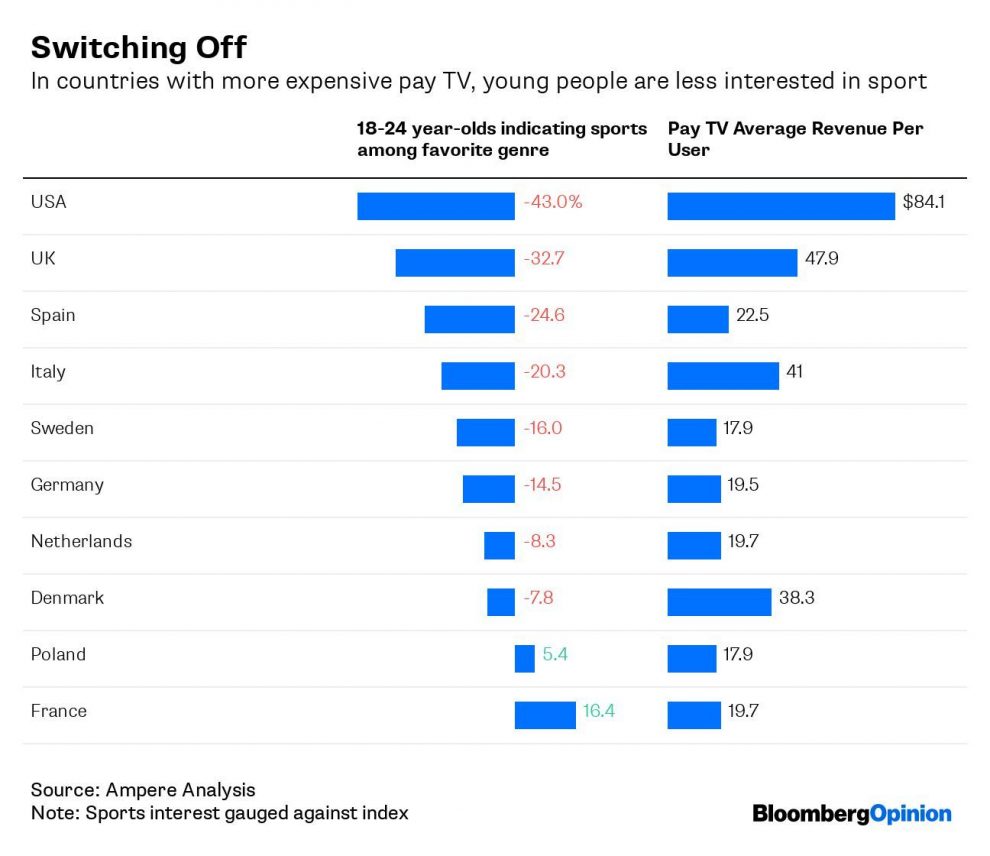
(Bloomberg Opinion) — England won the Cricket World Cup on Sunday, defeating New Zealand in one of the greatest one-day games ever played. The victory was characterized by the sort of risk-taking and inventiveness which Comcast Corp.’s British pay-TV arm could also use.
Sky has long been the broadcast home of English Premier League soccer games. In the past 15 years, it has also hoovered up the rights to cricket matches, Formula One racing, and much more besides. Popular as these sports are in the U.K., though, they don’t have the same cultural pervasiveness as soccer. As more and more games have disappeared behind a paywall, younger viewers have switched off.
This is a strategic threat to Sky, which built a pay-TV empire by charging viewers to watch English soccer matches and then adding more sports. The fewer fans there are, the more difficult it will be to attract new customers. The 4.2 billion pounds ($5.3 billion) it spent on domestic Premier League rights alone over the past three years represented almost a quarter of its total European programming costs. But there is a counter-intuitive way to head this off, particularly when it comes to less popular sports: show matches for free occasionally.
The need to do this will become more pressing as the giants of Silicon Valley take their first, tentative steps into sports. Amazon.com Inc. will broadcast a handful of Premier League games next season, Facebook Inc. has deals to show Spanish soccer in India, and Alphabet Inc.’s YouTube will show some Major League Baseball games this year.
The hope for the league administrators and teams that own the broadcast rights is that these new entrants offer a way out of the almost Faustian pact they have made with subscription broadcasters: in return for more money, they have had to sacrifice some of their audience. The tech firms have both huge user bases and seemingly bottomless pockets of cash. Little wonder the Premier League went so far as to give Amazon a cut-price deal to give it a taster of its appeal.
Look at what happened when Sky allowed Channel Four, a British free-to-air broadcaster, to broadcast Sunday’s important match: the number of viewers doubled. Contrast that with the wider decline: Since Sky took English cricket behind a paywall in 2006, the audience for the Ashes, England’s biennial series against Australia, has fallen by almost 90%. The figures for F1 are also falling.
The appetite for watching live sport on TV appears to be waning as people have got used to highlights on social media. If Sky can rekindle enthusiasm for these events among younger viewers, it would have a chance of reversing that trajectory. Give them a taste, foster their interest, and they might buy a subscription.
The broadcaster, which Comcast acquired for 36 billion pounds in 2018, has time to experiment. The tech giants might take a few years to start bidding on rights for big sporting events as they establish whether the economics add up. For the broadcasters, there are inevitable risks, not least of losing existing subscribers who are happy with just the free-to-air matches. The trick will be selecting carefully which games it picks – and keeping the very best content behind the paywall.
To contact the author of this story: Alex Webb at [email protected]
To contact the editor responsible for this story: Edward Evans at [email protected]
This column does not necessarily reflect the opinion of the editorial board or Bloomberg LP and its owners.
Alex Webb is a Bloomberg Opinion columnist covering Europe’s technology, media and communications industries. He previously covered Apple and other technology companies for Bloomberg News in San Francisco.
<p class="canvas-atom canvas-text Mb(1.0em) Mb(0)–sm Mt(0.8em)–sm" type="text" content="For more articles like this, please visit us at bloomberg.com/opinion” data-reactid=”57″>For more articles like this, please visit us at bloomberg.com/opinion
©2019 Bloomberg L.P.












